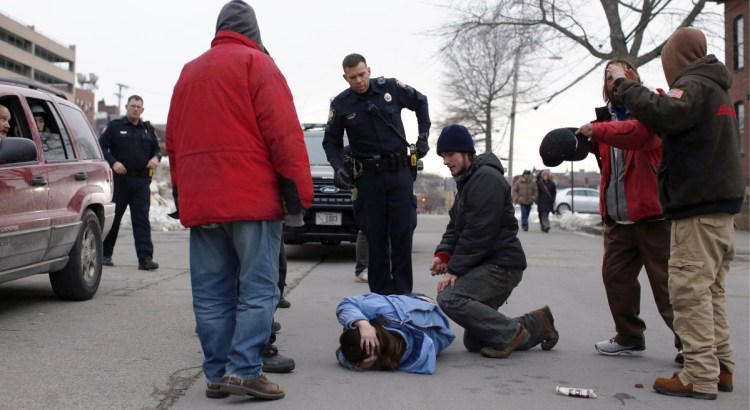It was with a resigned sense of frustration that I read the Maine Sunday Telegram’s recent story (“Bayside at rock bottom,” May 6) on the state of Portland’s Bayside neighborhood. It wasn’t frustration based on revelations from an investigative report full of new information, but frustration grounded in the reality that this, in fact, was old news. It was frustration based on the knowledge that all of the residents of Bayside – be they homeowners, homeless or the tortured souls battling a myriad of diseases that fall under the sterilized category of “behavioral health issues” – are stuck in a world far more interested in the troubles of the day than in the investment it takes to solve them.
It should be no surprise, based on the story, to see that the Bayside neighborhood has been the police department’s busiest patrol area throughout my entire 21-year career. Statistics show that in 2017, the Portland Police Department made 29 percent of our overall arrests in Bayside.
I hope that number is as staggering to you as it is to me. However, that number is easily justified because while the Bayside neighborhood accounts for less than 1 percent of the city’s landmass and only 5 percent of its population, it accounted for more than 20 percent, or 16,577, of our total calls for service during this same time frame. It should also be noted that 42 percent, or 6,940, of those Bayside calls were self-initiated by police officers proactively dealing with issues during their patrols.
We have added special attention to Bayside over the last nine months, which equates to $48,000 in patrol overtime for this neighborhood. We’ve also targeted enforcement of businesses that sell alcohol to visibly intoxicated individuals, in violation of their city-issued liquor license, and we’ve recently purchased chemical field tests for synthetic cannabinoids (drugs like Spice) in an attempt to stem the flow of this destructive drug onto our streets.
I’ll be the first to admit that arrests will always be an important part of the law enforcement equation, but we should also own the fact that they are an incredibly short-sighted and lazy approach to problem-solving. They have true value in dealing with crime in real time, and we will continue to provide that level of service, but they often measure the shattered and failed societal systems created to support our most needy loved ones rather than the battle between good versus evil.
I once looked at our yearly arrest numbers, which routinely break 3,000, with a sense of pride driven by a traditional law enforcement mentality that we can, in fact, arrest our way out of any problem. I was wrong, and unfortunately the Bayside neighborhood serves as the perfect example. We made 807 arrests in 2017 as we attempted to quell disorder and make our residents feel safe, but we haven’t been able to effectively change the underlying shattered systems that are the true cause of the problem.
This is a neighborhood full of compassionate people and providers who have simply been overwhelmed by the lack of investment by society. I say “society” as a whole because Bayside is full of people from across the state and the region who have been allowed to suffer, in some cases for decades.
To the Bayside neighborhood, I pledge that the Portland Police Department is truly invested in our ongoing efforts to make you feel safe in your world. I also pledge to continue our focused efforts on the predatory behavior of those who victimize others. I feel confident making those pledges because I’m honored to lead an agency full of professional crime fighters who will literally fight on your behalf when necessary while still maintaining a desire to divert people out of the criminal justice system when appropriate. I make these pledges with the knowledge that the city manager’s plans for a new sheltering and services system will effectively move our community firmly along the path to investing in our future.
Send questions/comments to the editors.



Comments are no longer available on this story